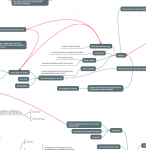Iggy Pop gave the 2014 John Peel Lecture and chose as his topic the issues surrounding free music and what that means for musicians.
I cannot stress enough the importance of study. … I played in my high school orchestra. And I learned the joy of the warm, organic instruments working together in the service of a classical piece.
That sticks with you forever. If anyone out there can get the chance to put an instrument and knowledge in some kids hands you’ve done a great, great thing.
Comparative information is a key to freedom.
—Iggy Pop
There’s a lot to unpack in his presentation. Eventually I’m going to come back to this presentation and break it down a little further.
But for the moment I just want to dwell for a moment on one of the ideas in here.
Public Response and the Free U2 Album
Earlier this year (2014) a new version of Apple’s iTunes software was released and with it everyone received — whether they wanted it or not — a free U2 album. The public response was quite negative. All sorts of people took to social media to complain about the free album and U2 and Apple.
This is important to note for a few reasons. People were upset (to the point of public complaint) about receiving something for free. This let’s us know that the free thing wasn’t worth anything to them in the first place.
Also, they were very upset. It isn’t like they just shrugged and went on with their lives. They were upset at having U2 show up in their iTunes library. This might point to the social status marker that music has been for some time; music conveys and broadcasts, to those who know us, our sense of taste.
Back when music-objects like CDs had value, if someone had shipped us all a U2 album we probably would’ve shrugged and either thrown it away like junk mail or filled every available slot at the used record emporium with copies of the album. Maybe making a couple bucks along the way.
But now it’s crystal clear that the music object has little value. Either because of licensing (we don’t actually own our music purchased in online stores like iTunes) or because of the habit of piracy (we don’t pay for the music we download from illegal download sites). Either side of the coin—paid or unpaid—the monetary value of the music-object is secondary to the role of music as status symbol or marker of taste.
There really isn’t a music-object anymore in most cases anyway.
Without the sale of music-objects, what next?
Iggy Pop makes an additional point when he notes that the music industry, which requires music-objects, is really just a brief blip of about 50 “Golden Years” before which musicians made their living quite differently.
As the music-objects become worthless it may be useful to examine how musicians made a go of it before music-objects came into being. Or how musicians make a go of it in places where the sale of music-objects doesn’t happen because of economic conditions or customs.
The music industry picked winners and losers during the “Golden Years” and as those years fade out, winners and losers will be picked differently.
What “differently” looks like or works like is still up for grabs. And we’re still able to make a pass at catching it and running with it.
That catching and running will probably not rely on ownership or transfer of music-objects. This is unfortunate for the music industry as it was structured during its heyday.
But it is fortunate for those who might stand to gain from a re-shuffling of the winners and losers of the music marketplace.
What we can observe
People don’t value the music-object (CD, digital file, etc) in a monetary way.
People do value music itself, perhaps “musick” in the broader sense of Christopher Smalls’ Musicking, as an element of their status or taste.
We may not be able to support our musical activity from the sale of the music-object, but the status stuff I think will prove to be a winner.

